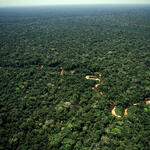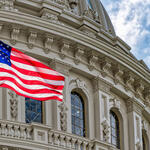- Date: 07 December 2022
The future of the plastic waste crisis will be determined by the actions the world takes today to address it. Some of the world’s largest brands—and users of single-use plastic—have gotten started, by setting time-bound commitments to reduce their plastic waste footprints. If met, many of these targets can help prevent upwards of 50M metric tons of plastic waste by 2030*.
It's crucial, for both people and the planet, that these companies succeed. WWF launched ReSource: Plastic in 2019 with the purpose of closing the “how” gap for success, equipping companies with the latest data and insights they need to take actions that maximize the potential for impact. Through an innovative measurement framework, ReSource helps companies translate their ambitious commitments into meaningful, measurable progress on plastic waste reduction.
- Date: 15 November 2022
On America Recycles Day 2020, the United States announced a target recycling rate of 50% by 2030. It’s an impressive goal, and there’s a lot of work to be done to get there. Just two years into that goal, not enough progress has been made. With about 22,000 municipalities managing their own recycling systems, we need national ambition and consistent action to change the way we recycle.
That’s why OneSource Coalition is putting Extended Producer Responsibility—also known as EPR—at the forefront of today's America Recycles Day 2022.
- Date: 15 November 2022
- Author: Yvette Cabrera (NRDC) and Pete Pearson (WWF)
COP27 (the 27th meeting of the Conference of Parties to the international climate convention) is underway and we face the stark realization that we are missing our climate targets globally.
But there is hope. Food loss and waste (FLW) are significant contributors to human-caused greenhouse gas (GHG) emissions, responsible for 8-10% of emissions globally. Reducing FLW alone can cut methane emissions by up to 15%, which is half of the Global Methane Pledge of 30% reduction by 2030. To drive down emissions and keep global warming below the critical 1.5ºC, food loss and waste reduction is a top climate solution that must be accounted for in countries’ Nationally Determined Commitments (NDCs) towards the Paris Climate Agreement.
- Date: 07 November 2022
- Author: Linda K. Walker, Senior Director, Corporate Engagement, Forests, WWF
WWF and HP accelerate forest protection, management and restoration in key landscapes in Australia, Brazil and Peru
As a part of World Wildlife Fund (WWF) and HP Inc.’s expanded forest conservation partnership to help protect, restore and improve the management of nearly 1 million acres of forest, our collaboration will accelerate forest protection and restoration efforts in Brazil’s Atlantic Forest, a global biodiversity hot spot and home to some of the last jaguar populations on Earth. We will also accelerate conservation efforts in two new landscapes: Madre de Dios in Peru, near the headwaters of the Amazon River basin, and the forests of eastern Australia, home to endangered koalas and other species that have been severely impacted by recent wildfires. Work in these three critical landscapes totals nearly 450,000 acres (182,000 hectares).
WWF and HP’s approach recognizes the paramount importance of protecting and better managing existing forests, then restoring forests that have been lost. Our work is grounded in a commitment to put people first, ensuring that each effort prioritizes Indigenous people and community engagement, social safeguards, transparency, and equitable benefits. By doing so, we are not only ensuring a future for forests but also for those who depend on them.
- Date: 13 October 2022
- Author: Sheila Bonini, Senior Vice President, Private Sector Engagement
Every two years WWF releases the Living Planet Report, our flagship publication chronicling biodiversity trends. And the numbers are shocking. WWF’s 2022 Living Planet Index shows an average 69% plunge in global vertebrate species populations - mammals, birds, amphibians, reptiles and fish - between 1970 and 2018. Most alarming is that monitored freshwater populations have dropped by an average of 83%.
While these statistics point to a dire situation, we need to take this as an alarm bell, not a death knell. We are capable of reversing biodiversity loss to secure a nature-positive world. And there are plenty of actors from all sectors helping to lead the way.
In that spirit of hope, we asked some of our corporate partners to share their thoughts about why this issue is important to them and how they are working to reverse these trends.
- Date: 29 September 2022
- Author: Christine Black, The Coca-Cola Company & Mary Jo Snavely, WWF
In 2007, The Coca-Cola Company and World Wildlife Fund (WWF) teamed up to tackle the goal of helping ensure access to quality water for communities, nature and businesses around the world. Our work focused initially on securing 11 priority freshwater basins—from the Mesoamerican Reef in Central America and Yangtze River in China to the Danube River in Europe, Rio Conchos in Mexico and Umzimvubu River in South Africa—partnering in more than 50 countries with local cooperation across all Coca-Cola operating units worldwide. Together, we have helped improve water security in some of the world’s most water-stressed areas.
Recognizing the opportunity to do more for both our planet and communities, we expanded the scope of our collaboration to improve environmental performance across the global Coca-Cola supply chain. We launched projects to address critical global challenges: reimagining how Coca-Cola could source agricultural ingredients, reduce greenhouse gas emissions and transform its packaging to reduce plastic waste. What seemed like a novel experiment at the time evolved into the gold standard for corporate/NGO partnerships by catalyzing collective action with governments, local communities and other businesses.
- Date: 19 September 2022
The passage of the Inflation Reduction Act is a bold step towards rapidly reducing U.S. emissions and limiting global warming, at a time when we really need to make swift strides towards our climate goals. Although the legislation doesn’t go quite far enough, it remains the biggest investment that the United States has ever made in clean energy and decarbonizing our economy.
To rapidly decarbonize and halve U.S. emissions by 2030, which is the goal that allows us to limit global warming to 1.5 degrees Celsius, we need leadership at every level of the economy. Small and medium-sized businesses (SMEs), which represent a significant amount of job creation and economic activity in the U.S. are already taking steps to address climate change and build resilient business futures by reducing their emissions.
Alone, the impact of one small business appears minimal compared to the global climate challenge, especially next to the activity of the largest corporations and heaviest polluters. But together, SMEs make up 90% of businesses worldwide, affect the livelihoods of over two billion people, and drive innovation that reaches the biggest business leaders. That’s a force to be reckoned with.
- Date: 03 August 2022
- Author: Sheila Bonini, Senior Vice President, Private Sector Engagement
The recent news of a deal on a Congressional budget reconciliation package that includes unprecedented federal investment focused on climate change and clean energy is an opportunity that cannot be missed.
To understand the urgency around addressing the climate crisis, look no further than the frequent and extreme storms and unprecedent heatwaves that we are experiencing this summer due in part to human-caused global warming. These past few months have been a window into the more dire impacts of climate change we can expect unless we limit warming to 1.5° C (2.7° F) according to a recent report by the United Nations.
Leading businesses are doing their part to address climate change by setting ambitious climate goals and tackling their own emissions. In fact, more than five dozen of the U.S. Fortune 500 companies have set climate goals approved by the Science Based Targets initiative (SBTi). These are great first steps towards the global goal of halving emissions by 2030, but we need leadership from Washington to incentivize clean energy investment and supply chain decarbonization to achieve climate mitigation at scale.
- Date: 22 April 2022
- Author: Marcene Mitchell and Sheila Bonini
The Securities and Exchange Commission (SEC) recently announced a proposed rule that would require companies to include climate-related information in their regulated financial reporting, including in their annual 10-K statements. The climate-related disclosures would range from the company’s greenhouse gas footprint to climate risks and the strategies they are employing to mitigate the impact of climate change on their business.
WWF welcomes the SEC rule, particularly in light of the recent Intergovernmental Panel on Climate Change (IPCC) report, which makes clear the risk of inaction on climate change. The world has now reached 1.1°C of warming, and we’re already seeing enormous harm and damage to our communities, economy, human health, food and water security, and natural ecosystems. The report highlights the urgent need for a whole-of-society approach to staving off the worst effects of the climate crisis. The corporate disclosures required by the SEC’s proposed rule are an integral part of the solution.
- Date: 08 February 2022
Following the release of WWF's ReSource: Plastic Transparent 2021 report, we sat down with Lisa Morden, Vice President of Safety, Sustainability & Occupational Health at Kimberly-Clark, to discuss the company's involvement in the ReSource program, the importance of transparency, plus the greatest challenges and most promising solutions to the plastic waste crisis.
…








